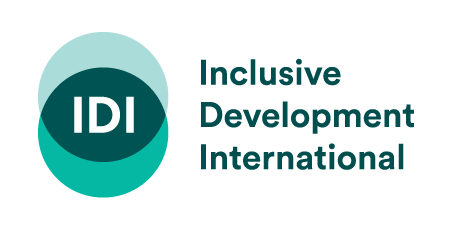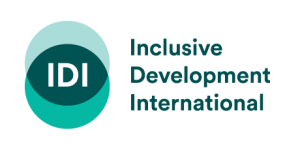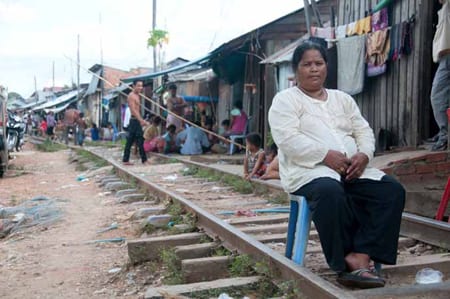Families resettled by Cambodia’s railway rehabilitation project filed a complaint today with the Australian Human Rights Commission (AHRC) alleging that they have suffered serious violations of their human rights as a result of resettlement under the project, which is partly funded through a grant from AusAID. The complaint, which was jointly submitted on behalf of 30 affected families by Equitable Cambodia (EC) and Inclusive Development International (IDI), claims that the Australian Government failed to uphold its international human rights obligations by providing significant funding to the railway project without taking sufficient measures to safeguard against breaches of human rights.
The Railway project, financed mainly by loans from the Asian Development Bank (ADB) and grants from the Government of Australia, affects at least 4164 families who live alongside the dilapidated railway tracks. At least 1200 families are required to relocate in order to make way for the project. A joint venture of the Australian firm Toll Holdings and the Cambodian firm Royal Group secured a 30-year concession to operate the refurbished railways.
“We repeatedly warned AusAID about the high risk of human rights violations since early 2010, but AusAID failed to take sufficient remedial and correction action to avoid abuses and mitigate harms that people have suffered,” said David Pred, Managing Associate of Inclusive Development International. “Australian aid has thus had the unintended but grave consequence of contributing to the impoverishment of some of Cambodia’s poorest families.”
The complaint focuses largely on breaches of the International Convention on the Rights of the Child, as children in particular are bearing the brunt of displacement.
The complaint quotes a mother of three who says that she no longer has enough money to feed her children three meals a day and send them to school, so two out of three have dropped out. One daughter now works at a factory and the other stays home and helps her cook and clean. She says that her children were not often sick before resettlement and are now “always sick” with headaches because they are hungry.
Eang Vuthy of Equitable Cambodia, which has been monitoring the impacts of the Railway resettlement process since 2010, confirmed that “children and especially girls are dropping out of school and in some cases have gotten work in factories to supplement the family income and help pay interest on debt.”
The complaint claims that health and safety failures of the resettlement process have had fatal consequences for children. Most notoriously, in May 2010 two children drowned in a pond four days after their families were relocated to a Battambang resettlement site without any water supply. The pond adjoining a nearby rice field was the main water source available to the families at the time. In November 2011, two children were hit by a truck while they were walking back from school to the Poipet resettlement site. One child died and the other sustained serious injuries. No school was provided at the resettlement site as the families were promised, so children have been forced to walk 4 km and cross a busy road to get to their old school.
‘These human rights violations were highly foreseeable and could have been avoided,” said IDI Legal Associate Natalie Bugalski. “When Australia decided to act outside of its borders by providing significant financing to the railway rehabilitation, AusAID became obliged to take measures to ensure, to the best of its ability, that the human rights of those to be affected would be respected. While the Government of Cambodia bears the primary responsibility to ensure respect for the human rights of project-affected people, AusAID is also partly liable for the human rights violations suffered,” she added.
“Resettlement should be a chance for development for affected people,” stated Eang Vuthy. “They should be active participants in the project and it should make their lives better off. They certainly shouldn’t drag people into poverty and exploitation. We need a win-win approach,” he explained.
The complainants have requested a number of remedies from AusAID, together with ADB and the Cambodian Government, including debt relief, compensation for their lost income and support to meet the basic needs of their children.
In addition to the direct reparations for breaches of human rights of affected persons, the complaint calls upon AusAID to adopt human rights safeguard policies and practices including a requirement to conduct human rights impact assessments for all projects to which it is considering providing support.
“We are calling on the Government to adopt a human rights based approach to international development,” said Rachel Ball of the Human Rights Law Centre, which assisted with the complaint. “Incorporating human rights into the development and delivery of aid programs is central to aid effectiveness and can prevent large scale violations such as those associated with the railways project,” she said.
Click here to download the full complaint.
Click here to download the press release.


